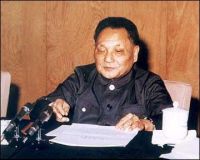Difference between revisions of "Third Plenary Session of the 11th Central Committee of the Communist Party of China"
imported>Ciic (Created page with 'The '''Third Plenary Session of the 11th CPC Central Committee''', held in Beijing from December 18 to 22, 1978, was a turni...') |
imported>Ciic m (Protected "Third Plenary Session of the 11th Central Committee of the Communist Party of China" ([edit=sysop] (indefinite) [move=sysop] (indefinite))) |
||
| (One intermediate revision by the same user not shown) | |||
| Line 1: | Line 1: | ||
| + | [[File:szqh.jpg|thumb|200px|right|Deng Xiaoping at the Third Plenary Session of the 11th CPC Central Committee, 1978. ]] | ||
The '''Third Plenary Session of the 11th CPC Central Committee''', held in [[Beijing]] from [[CIIC:Selected anniversaries/December 18, 2009|December 18]] to 22, 1978, was a turning point in the history of both the Party and China. The session criticized the principle of "two whatevers" ("we will resolutely defend whatever policy decisions Chairman Mao made and unswervingly follow whatever instructions Chairman Mao gave"), while approving a complete and accurate study of [[Mao Zedong Thought]]. It held a key discussion on the theme "Practice is the sole criterion for testing truth"; established the watchwords of emancipating the mind, seeking truth from facts, and uniting to face the future; it rectified erroneous slogans and shifted the emphases to socialist modernization and the policy of reform and opening up; issued decisions on promoting agricultural development and set the goals of strengthening socialist democracy and improving the socialist legal system; it also re-evaluated some former State and Party leaders. The session decided to set up the [[CPC Central Commission for Discipline Inspection]]. | The '''Third Plenary Session of the 11th CPC Central Committee''', held in [[Beijing]] from [[CIIC:Selected anniversaries/December 18, 2009|December 18]] to 22, 1978, was a turning point in the history of both the Party and China. The session criticized the principle of "two whatevers" ("we will resolutely defend whatever policy decisions Chairman Mao made and unswervingly follow whatever instructions Chairman Mao gave"), while approving a complete and accurate study of [[Mao Zedong Thought]]. It held a key discussion on the theme "Practice is the sole criterion for testing truth"; established the watchwords of emancipating the mind, seeking truth from facts, and uniting to face the future; it rectified erroneous slogans and shifted the emphases to socialist modernization and the policy of reform and opening up; issued decisions on promoting agricultural development and set the goals of strengthening socialist democracy and improving the socialist legal system; it also re-evaluated some former State and Party leaders. The session decided to set up the [[CPC Central Commission for Discipline Inspection]]. | ||
Latest revision as of 07:52, 7 July 2011
The Third Plenary Session of the 11th CPC Central Committee, held in Beijing from December 18 to 22, 1978, was a turning point in the history of both the Party and China. The session criticized the principle of "two whatevers" ("we will resolutely defend whatever policy decisions Chairman Mao made and unswervingly follow whatever instructions Chairman Mao gave"), while approving a complete and accurate study of Mao Zedong Thought. It held a key discussion on the theme "Practice is the sole criterion for testing truth"; established the watchwords of emancipating the mind, seeking truth from facts, and uniting to face the future; it rectified erroneous slogans and shifted the emphases to socialist modernization and the policy of reform and opening up; issued decisions on promoting agricultural development and set the goals of strengthening socialist democracy and improving the socialist legal system; it also re-evaluated some former State and Party leaders. The session decided to set up the CPC Central Commission for Discipline Inspection.
After the meeting, the second generation of Party leaders formed around Deng Xiaoping. The meeting marked China's entry into a new era of socialist modernization and construction.
